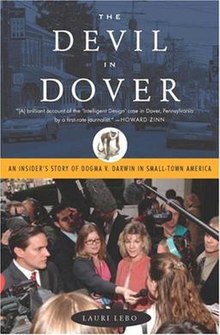The Devil in Dover: Difference between revisions
No edit summary |
|||
| Line 14: | Line 14: | ||
The book explores the behind-the-scenes events that led to the filing of a lawsuit by Tammy Kitzmiller and ten other parents in Dover, Pennsylvania in 2005 and covers the events of the trial up to and after the verdict for the plaintiffs by Judge [[John E. Jones III]], with an emphasis on what the case meant for the citizens of Dover.<ref>[http://www.au.org/site/News2?abbr=cs_&page=NewsArticle&id=9859|The Devil in Dover]</ref> |
The book explores the behind-the-scenes events that led to the filing of a lawsuit by Tammy Kitzmiller and ten other parents in Dover, Pennsylvania in 2005 and covers the events of the trial up to and after the verdict for the plaintiffs by Judge [[John E. Jones III]], with an emphasis on what the case meant for the citizens of Dover.<ref>[http://www.au.org/site/News2?abbr=cs_&page=NewsArticle&id=9859|The Devil in Dover]</ref> |
||
It deals with the involvement of outside parties like the [[Discovery Institute]], [[Thomas More Law Center]], [[ACLU]], the scientific, religious and philosophical issues raised by the intelligent design movement, and the pitfalls for journalists covering a controversy like |
It deals with the involvement of outside parties like the [[Discovery Institute]], [[Thomas More Law Center]], [[ACLU]], the scientific, religious and philosophical issues raised by the intelligent design movement, and the pitfalls for journalists covering a controversy like ''Kitzmiller'', particularly small-town reporters.<ref>[http://www.thenewpress.com/index.php?option=com_title&task=view_title&metaproductid=1693|The Devil in Dover by Lauri Lebo]</ref> |
||
It details Lebo's personal experience of the trial, including her interactions with her fundamentalist father, who favored the defendants. |
It details Lebo's personal experience of the trial, including her interactions with her fundamentalist father, who favored the defendants. |
||
== Reviews == |
|||
In his review in the [[Columbia Journalism Review]], Tim Townsend praised the book for giving readers a feeling of what it was like leading up to the trial and immediately afterwards, but criticized it for having unnecessary subplots about Lebo's personal experiences with her father and her own beliefs. Townsend said this distracted "from Lebo’s more important story about the ugly rift that religion has created in America, and the responsibility of journalists covering that rift to write truthfully rather than just provide equal time to both sides."<ref name=Townsend>{{ cite journal | last =Townsend | first =Tim| year =2008 | month =May/June | title =Love Thy Neighbor | journal =[[Columbia Journalism Review]] | volume = | issue = | pages = | id = | url =http://www.cjr.org/review/love_thy_neighbor.php?page=all | accessdate = 2008-06-10}}</ref> |
|||
Revision as of 05:49, 2 February 2009
 | |
| Author | Lauri Lebo |
|---|---|
| Subject | Intelligent design, Kitzmiller v. Dover Area School District |
| Publisher | The New Press |
Publication date | 2008 |
| Pages | 256 |
| ISBN | ISBN 978-1-59558-208-9 Parameter error in {{ISBNT}}: invalid character |
The Devil in Dover: An Insider's Story of Dogma v. Darwin in Small-Town America is a book by journalist Lauri Lebo about the Kitzmiller v. Dover Area School District intelligent design trial, through her own perspective as a local reporter on the trial as she confronted her own attitudes about organized religion and her father who was a fundamentalist Christian.
Themes
The book explores the behind-the-scenes events that led to the filing of a lawsuit by Tammy Kitzmiller and ten other parents in Dover, Pennsylvania in 2005 and covers the events of the trial up to and after the verdict for the plaintiffs by Judge John E. Jones III, with an emphasis on what the case meant for the citizens of Dover.[1]
It deals with the involvement of outside parties like the Discovery Institute, Thomas More Law Center, ACLU, the scientific, religious and philosophical issues raised by the intelligent design movement, and the pitfalls for journalists covering a controversy like Kitzmiller, particularly small-town reporters.[2]
It details Lebo's personal experience of the trial, including her interactions with her fundamentalist father, who favored the defendants.
Reviews
In his review in the Columbia Journalism Review, Tim Townsend praised the book for giving readers a feeling of what it was like leading up to the trial and immediately afterwards, but criticized it for having unnecessary subplots about Lebo's personal experiences with her father and her own beliefs. Townsend said this distracted "from Lebo’s more important story about the ugly rift that religion has created in America, and the responsibility of journalists covering that rift to write truthfully rather than just provide equal time to both sides."[3]
References
- ^ Devil in Dover
- ^ Devil in Dover by Lauri Lebo
- ^ Townsend, Tim (2008). "Love Thy Neighbor". Columbia Journalism Review. Retrieved 2008-06-10.
{{cite journal}}: Unknown parameter|month=ignored (help)
See also
Further reading
- Edward Humes, 2007. Monkey Girl. Jonathan Cape. Monkey Girl: Evolution, Education, Religion, and the Battle for America's Soul. The first book account of the Kitzmiller v. Dover Area School District trial
- Matthew Chapman, 2007. 40 Days & 40 Nights. Harper Collins. A great-great-grandson of Darwin reflects on the "Dover monkey trial".
